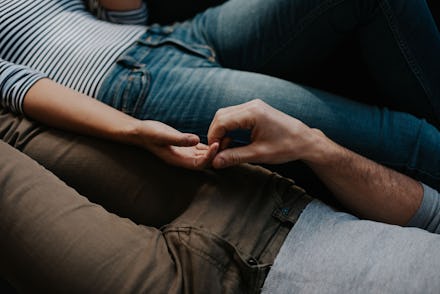How volunteering can make you a better partner

Volunteering can be a deeply fulfilling way to support your community, especially important at a time when many social services have come under threat. Beyond altruism, though, volunteering may have another, unexpected benefit: It could enhance your romantic relationship.
Mic spoke with Rachel Madorsky, a psychotherapist and relationship coach in Austin, Texas, about how volunteering — whether alone or with your boo — could make you stronger as a couple. According to Madorsky, volunteering could help you:
Feel more secure in your relationship
Depending on how you bonded with your primary caregivers, you have one of four attachment styles. If you’re securely attached, you feel safe in relationships, which enables you to grant yourself and your partner the independence everyone needs. If you’re anxiously attached, you probably act insecure and needy in relationships, and if you’re avoidantly attached, you likely create emotional distance from your partner. If you have disorganized attachment (common in those who have been abused), you may behave in erratic, confusing ways in relationships.
A study by researchers at UC Davis and other institutions found that people with anxious attachment showed more secure attachment when community service was a part of their lives. These findings make sense to Madorsky; if you’re anxiously attached, you probably focus much of your attention on your own worries, but volunteering forces you to direct your attention to something else, which often lowers anxiety. And, “when we’re doing something we feel good about, it increases our self-esteem, our confidence, and our own sense of security,” Madorsky says.
If you’re avoidantly attached, volunteering may provide a safe, low-stakes scenario for you to practice connecting with others structured activities and other interactions that don’t leave you worrying as much about what to say or do, or whether you’re overstepping others’ boundaries. “It feels like a stretch, but doesn’t feel stressful,” Madorsky says. Building these skills in a volunteer setting may help you feel confident enough to build them with your partner.
Feel more confident in your relationship
Imagine taking the “temperature” of your relationship. Do you feel good about your relationship? Worried about its future? Volunteering with your partner could nudge your relationship toward a healthy temperature, boosting not only confidence in yourselves, but in your relationship and where it’s headed. Even if only one of you has time to volunteer, that could still help. “All the good things we give to ourselves, we give to our relationship,” Madorsky tells Mic. In other words, if you’re investing in helping people who need it, you’ll gain confidence in yourself. And you’ll bring that same confidence to your partnership.
Deepen appreciation for your partner
Much like how you might feel good about yourself when you volunteer, you’ll likely feel good about your partner when they do the same, especially if it’s for a cause you value. “We start looking at our partner a little differently,” Madorsky says, about watching them participate in selfless activities. “We start seeing what a good person they are… and it fills us up with love.”
Volunteering as a couple could also make your more appreciative of each other by creating “a shared experience where there’s opportunities to be touched and inspired by something together” — similar to the reasons you might binge-watch Insecure or The Office together, Madorsky says, except this time, you get to make those awe-filled moments in real life.
Feel more worthy of receiving in your relationship
Sometimes, self-sabotaging behavior can prevent you from receiving more than you think you deserve, since opening yourself up to something better can feel strange or uncomfortable, Madorsky says. If you have trouble receiving, you may wind up with a partner who doesn’t have much to give, or worry about asking for more from the relationship. Sharing your time and skills with others may shift that mindset, helping you see yourself as worthy of receiving, too.
Of course, the main goal of volunteering is to serve a community or cause, but it definitely doesn’t hurt that it could enrich your relationship, too.